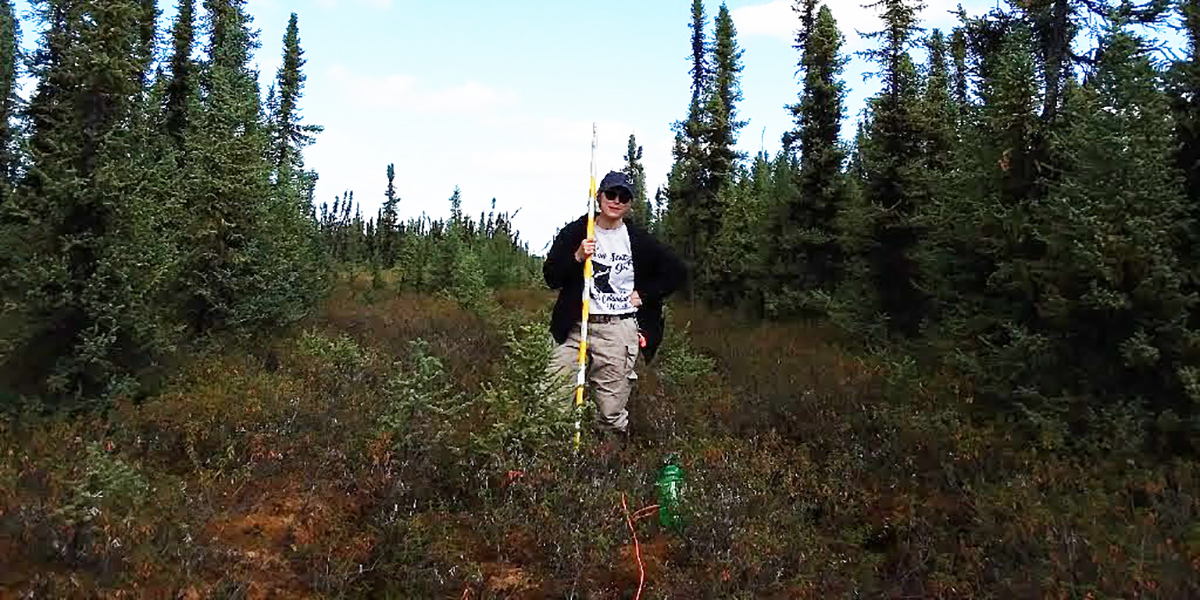Rolling green valleys, rivers teeming with rainbow trout, and roaming moose characterize this northeastern Canadian jewel—the Peace River Region. It has been home and life to generations of Indigenous peoples in British Columbia. It is also where BCIT alumna Mae Whyte puts her passion for both environmental conservation and community building into meaningful action.
“I would describe my job as helping to heal the land,” says Mae, who works in the region for Blueberry River First Nations as a Restoration Project Officer. “Basically, as a restoration practitioner, I write out a prescription for the land and implement it.”
Restoration with Indigenous content
Over the years, environmental degradation caused by human activities has changed the Peace River Region. However, with the help of experts like Mae, careful restoration can help reverse losses, promoting the recovery of ecosystems. This, in turn, can improve human wellbeing through things like improved water quality for the local community.
The key to successful restoration in this region, Mae emphasizes, can only be achieved by engaging with, learning from, and working with the local communities that call it home.
“Culturally appropriate ecological restoration involves member engagement and participation in the restoration planning and actions, and their feedback into what the desired end-use of the land might be,” she explains. “For example, traditional ecological knowledge like from an Elder who may remember the site from years ago, may help inform the desired conditions. This is so important because Indigenous stewardship of the land has been going on for tens of thousands of years, and the current and future needs of local communities is paramount.”
Says Tami Pierce, Associate Director, BCIT Indigenous Initiatives and Partnerships, “Mae illustrates the importance of engaging First Nations communities in respectful dialogue and consultation when it comes to ecological restoration on the ancestral lands of Indigenous peoples.”
The road to conservation
After completing undergraduate and graduate degrees in the arts, Mae began her career working in tourism, first with the City of Fredericton and then with Tourism Vancouver. She was successful and effective in those roles but found herself naturally pulled in another direction.
“When I was working in tourism, I was spending all my free time volunteering for environmental causes including The Wildlife Rescue Association of BC and The Stanley Park Ecology Society,” she recalls. “I felt like I wanted to do more. I felt called to do more.”
In 2015, Mae decided to turn her volunteer environmental work into a new career. She registered in BCIT’s Fish, Wildlife, and Recreation diploma program and then, after completing it, returned to BCIT to enroll in the Bachelor Science, Ecological Restoration program, graduating from it in 2019.
As someone who had already completed two degrees before attending BCIT, Mae might be considered a seasoned student, who could face additional education from BCIT with ease. But she says that the programs pushed her and that her classmates and peers inspired and challenged her to do her best work.
While at BCIT, Mae’s best work was recognized with numerous awards including The BCIT Alumni Association Entrance Award, The BCIT Foundation Scholarship, The Burnaby Fish and Game Club Herbert Karras Award, The Mark Angelo Award, and the BCIT Bachelor of Science in Ecological Restoration Award for being the top student.
Mae says her instructors, in particular, were instrumental in preparing her for making a difference after graduation.
“I had a lot of great female mentors in what was, generally, once a male-dominated field,” she says. “Learning to not be content with the status quo was a big lesson I learned at BCIT as was the importance of building community. Many of my instructors, regardless of gender, would go above and beyond, not just for me but for our whole cohort. If we needed help outside of class time, they were always there for us.”
Looking and learning ahead
With three degrees and a diploma (so far) under her belt, it’s fair to say lifelong learning is in Mae’s DNA. It’s a big part of her success as a restoration officer. She is constantly seeking input from local communities—learning from the people who live there—to inform restoration activities in the area.
And she’s not done learning. Mae is currently working towards becoming a Registered Professional Biologist, an accreditation she estimates she will earn in about 18 months. She also hasn’t stopped learning through volunteering. This year, she joined the boards of two different organizations and highly recommends BCIT students find a way to give back of their time, too.
“I strongly endorse volunteering,” offers Mae to BCIT students or alumni looking to advance their careers. “Volunteering has helped me in many of my personal achievements. I’ve made friends and personal connections that have helped me for awards reference letters and job applications. The expression, ‘it’s not about what you know, it’s about who you know’ is true. Volunteering can be a powerful networking tool.”
BCIT Fish, Wildlife and Recreation diploma students who started the two-year diploma in 2019 will be the program’s 50th graduating class in 2021. Learn more about this program.

Great article. Mae, it’s great to see you succeeding while also continuing to learn. Looks like you’re doing meaningful work. Hope to cross paths again some day 🙂
It’s wonderful to see what you’re up to, Mae, and that you’re continuing to go above and beyond as you did at BCIT.
Great work Mae – We miss you here, but are so thrilled to see you doing such important work!!
Cheers,
Eric